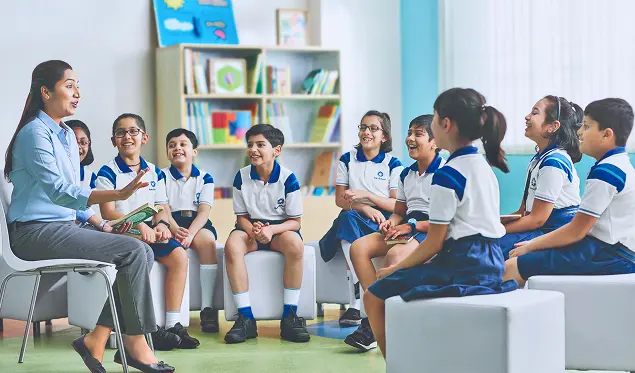Children progress at different rates when growing up. However, there are common milestones that children achieve between ages 4 to 5. Recognising these changes helps adults guide them through this important phase. In this blog, we will explore the significant milestones children experience in their thinking, emotions, and social interactions between ages 4 to 5.
Physical Development
At 4-5 years, children show considerable gains in gross and fine motor skills. They become more coordinated and can engage in activities that require increased dexterity and strength. During this stage, children can typically:
- Sing a song
- Jump rope
- Walk backwards
- Hop on one foot and balance on one leg for a few seconds
- Throw, catch, and kick a ball with improved accuracy
- Walk downstairs alone
- Doing a heel-to-toe walk
- Use utensils skilfully and dress themselves with minimal assistance
- Draw recognizable shapes, such as circles and squares, and begin to write some letters and numbers
60 minutes of daily physical activity is recommended for their physical development.
Also Read: Development Milestone
Cognitive Development
Cognitive advances are profound in preschoolers as they become more capable of complex thought processes. Their understanding of the world expands rapidly as they develop:
- Improved problem-solving abilities and an understanding of cause and effect
- A longer attention span that allows engagement with tasks for more extended periods
- A growing memory capacity, leads to better recall of experiences and information
- Pre-literacy skills, include recognising some letters, understanding the concept that print carries meaning, and sometimes, beginning to read simple words.
During this stage, children can typically:
- Draw a square
- Build simple towers with blocks
- Use scissors
- Put on clothes independently
- Learn to tie shoe laces
- Draw a triangle
- Use a butter knife
- Navigate obstacles
- Ride a bike
At this stage, playing remains an essential medium for cognitive growth, as it encourages imagination, creativity, and learning through experience.
Emotional Development
At ages 4-5, children start to grasp their own emotions and the feelings of others. Emotional development includes:
- Expressing a wide range of emotions and learning appropriate ways to show them
- Developing empathy as they start to recognise and respond to the emotions of others
- Beginning to understand and follow rules, contributes to a basic understanding of morality
- Displaying a desire for independence, often asserting themselves and even arguing to have their way
During this stage, children can typically:
- Express happiness, sadness, anger, and fear
- Be independent and do things on their own
- Be moody and aggressive
- Start making friends and understanding the rules
- Become attached to parents as they start attending school
- Start making decisions in daily tasks
- Try to negotiate and resolve conflicts among friends
Positive reinforcement and guidance from caregivers are crucial for helping preschoolers navigate their emotions at this stage.
Also Read: Delayed Developmental Milestones
Social Development
Social development is especially prominent as children learn to interact with peers and adults in more complex ways:
- Playing cooperatively with other children, taking turns, and sharing become more consistent
- Forming friendships based on common interests rather than mere convenience
- Engaging in imaginative play with others, which often involves role-playing and negotiating rules
- Understanding social norms and expectations, although they might still require guidance
The development of social skills is facilitated through group activities, including preschool programs and playdates.
Language Development
Preschoolers experience a significant expansion of their vocabulary, sometimes learning multiple new words daily. By age 5, most will:
- Be able to speak in complete sentences with correct grammar most of the time
- Ask many questions as they try to understand the intricacies of the world around them
- Communicate their thoughts and needs effectively, which is important for social interaction and emotional expression.
- Like to tell stories
- Know the days of the week and months
- Understand commands with multiple instructions
- Talk often
- Put 6-8 words together in a sentence.
- Know coins and money
- Know 4 or more colors
Reading to children and engaging in conversations are effective ways to foster language development.
Also Read: Language Development Activities
Strategies to Support Development
To support the development of children between 4-5 years, caregivers and educators can:
- Provide a variety of physical activities to hone motor skills and encourage a healthy lifestyle
- Offer cognitive challenges through puzzles, games, and open-ended questions
- Validate and label emotions to help children understand and manage their feelings
- Create opportunities for socialisation with peers in diverse settings
- Read to children frequently and involve them in conversations to enhance language skills
- Appreciate and praise them for their good behaviour and achievements
Seeking help
Each child is unique and may reach developmental milestones at their own pace. However, understanding typical progress during this period is essential for identifying any developmental concerns early. Signs of developmental delays in kids aged 4-5 years may include
- Speech difficulties or trouble forming sentences
- Difficulty following instructions or understanding simple commands
- Challenges in social interactions or making friends
- Struggles in expressing emotions or understanding others’ feelings
- Delays in physical abilities such as hopping, jumping, or balance
Seek advice from a paediatrician for a proper evaluation.
At EuroSchool we acknowledge the fact that the milestones at 4-5 years old are important for a child’s future growth and learning. We work with parents and educators to enable them to recognise these changes, keep track of progress, engage positively, and create a supportive atmosphere that greatly helps children grow.









